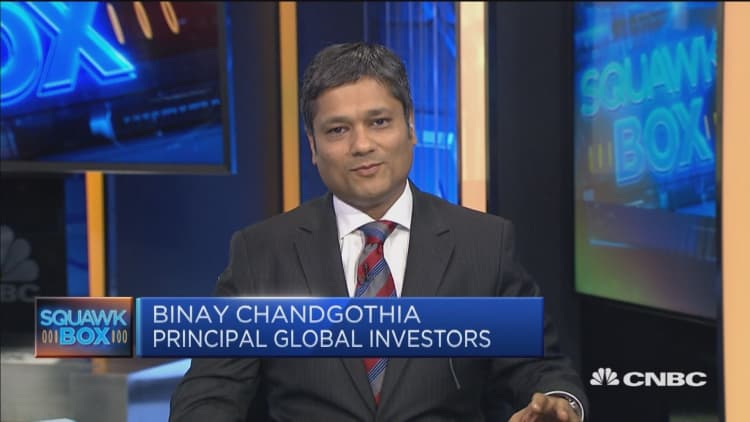
Investors have been pouring money into bonds this year even as central banks around the world are continuing to raise rates. Fixed income experts believe a turnaround could be at hand.
Bond exchange-traded funds took in $104 billion through September, the first time the group has ever topped the century mark, according to State Street Global Advisors, which runs the $564 billion SPDR ETF family.
The cash flight comes even as bonds have significantly lagged the performance of stocks this year. The $50.6 billion fund has returned just 1.5 percent year to date, compared to the 's surge of more than 14 percent.
The allure of a steady income stream and diverse portfolio continues to pull in investor cash to the $40 trillion fixed income space.
"Some of it is the demographic shift and the persistent need for income," said Matthew Bartolini, head of SPDR Americas Research at State Street. "There's more need for a stabler retirement income. It's not unforeseen to see this continued allocation into fixed income, even though rates may be rising."
Bond yields had remained remarkably in check even as the Fed and other central banks seek to exit the cheap-money policies of the financial crisis and its aftermath. Yields shifted in early September, and that has fixed income pros looking for a change in investor appetite.
Investors sent another $11.4 billion into bond ETFs in September. For the third quarter, inflows totaled $32.9, the most of any category, according to Citigroup. However, flows in October show the trend may be turning.
Stock-focused ETFs have brought in $223.9 billion this year.
While corporate bond funds continue to attract money, the popular iShares 20+ Year Treasury Bond ETF has seen just over $1 billion in outflows, the most of any fund so far this month, according to FactSet. Also, the iShares 7-10 Year Treasury Bond fund also has seen outflows totaling $319 million, ninth-most of any ETF.
Some Wall Street strategists are warning clients that a broader shift could be coming in the market.
"The post-September 8 interest rate inflection action has us on alert for a change in the year-to-date ETF flow narrative as we move into October," Scott Chronert, ETF strategist at Citigroup, said in a recent note to clients titled "Beware the changing narrative."
Chronert has been watching the iShares iBoxx $ High Yield Corporate Bond and the SPDR Bloomberg Barclays High Yield Bond over the past several weeks.
"Flows into both funds have been strong since interest rates bottomed in early September. Yields have remained fairly constant over that period, resulting in spread compression to near the lowest levels seen since 2014," he wrote. "Oil price gains likely contributed, but are showing signs of rolling over. Therefore, we are inclined to be more cautious than sentiment implied by recent inflows."
The Fed's intentions beyond raising interest rates also could have ramifications.
The central bank later this month will begin allowing a capped level of proceeds it receives from maturing bonds to roll off its $4.5 trillion balance sheet. At that point, market participants will be expected to step in and pick up the buying slack.
That might not be easy as it sounds.
"With the (balance sheet) unwind officially announced, additional bond supply will be hitting markets when investors are already very long duration, if losses start mounting as rates rise, outflows could feel as painful as in 2013," said George Goncalves, Nomura's head of U.S. rates strategy for fixed income.
State Street's Bartolini said investor rebalancing in the wake of the big stock market rally this year could still put demand in for fixed income, though that also could reverse quickly.



